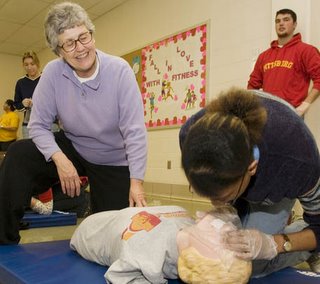30 years late, recognition is still welcome

Professor Sandy Bauchmoyer watches as a student
practices CPR for a class.
In January, Sandy Bauchmoyer stood on the basketball court at Ohio State University as a fieldhouse full of fans cheered. It was welcome recognition for a multi-sport athlete, even though it came more than 30 years late.
Ohio State recognized Bauchmoyer, a member of the faculty in Pittsburg State University's Department of Health, Physical Education and Recreation, and about 150 women from all over the U.S. in January for their athletic endeavors in the days before Title IX. Since Title IX, the first comprehensive federal law prohibiting sex discrimination against students and employees of educational institutions, was enacted in 1972, opportunities for high school and college female athletes have grown dramatically.
Bauchmoyer's story is similar to that of generations of women who were either forced to stand on the sidelines of all-male athletic events or go to extraordinary lengths in order to compete in relative obscurity.
Bauchmoyer credits her love of athletics and of competition, in part, to her experiences growing up in a small Ohio town. Two playmates – twin brothers Barry and Larry Blackstone – were constant companions. They played ball together and whiled away endless hours in friendly competition. That competition ended at the schoolhouse door, however.
"I get emotional when I talk about it," Bauchmoyer recalls. "I wanted to play so badly when I was in high school."
Bauchmoyer couldn't participate in school sports, so she took the only option available to her. She became a cheerleader.
"I had no desire to be a cheerleader," she said, "but I wanted to be involved."
Things were a little better at Ohio State University, where Bauchmoyer was a diver, competitive swimmer, basketball player and a member of the synchronized swimming team. At least she could compete, although none of the teams were considered varsity athletic teams and they certainly weren't supported financially in the same way that men's athletic teams were.
For road trips to other Big Ten schools, Bauchmoyer recalled, the women would take up a collection to put gas in the coach's car.
"We always felt like the women had to scramble and fight to get opportunities," Bauchmoyer said.
Bauchmoyer earned a BSED from Ohio State and went on to earn a master of science degree in education from Bowling Green State University and a Ph.D. from the University of Iowa. Bauchmoyer joined the faculty in PSU's Department of Health, Physical Education and Recreation in 1974. At PSU, she teaches sports psychology, motor development of children, teaching methods and first aid and CPR.
Bauchmoyer said most of her students have grown up in the years following Title IX, so they don’t have the understanding of the issues surrounding equity that comes with her own first-hand experience.
"It bothers me when women are blamed for having any of the pie at all," Bauchmoyer said.
Issues of equity go well beyond athletics, according to Bauchmoyer. And while laws such as Title IX have created many opportunities for women, lasting solutions require "a major attitude shift."
For Bauchmoyer, a sign that attitudes may be changing, was the fact that fans packed the fieldhouse at Ohio State to honor former female athletes.
"It was just wonderful to be down there on the floor and hear the applause," Bauchmoyer said. "I was shocked to see so many people at a women's event and it was just great to hear that crowd. It helped make up for all the years (I) competed and never heard the applause."
---Pitt State---

<< Home